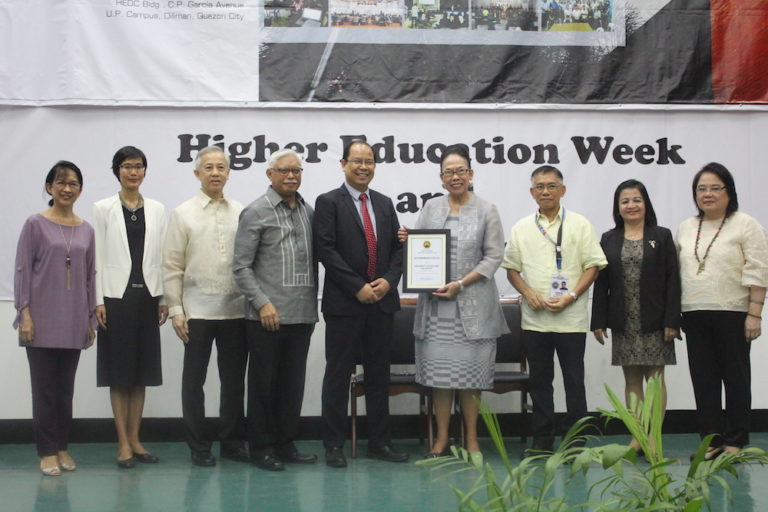The 2018 strategic goal of UA&P to achieve autonomy came much earlier when the Commission on Higher Education (CHED) officially granted autonomous status to the University effective May 9, 2017. The grant is valid for two years, ending on May 9, 2019.
The grant of autonomy is grounded on the Commission’s recognition of the “enormous contribution of private higher education institutions (HEIs) in the growth and prominence of tertiary education in the country and in the Asia Pacific Region. It also recognizes the institutions’ consistent committed service through quality education, research and extension work” (CHED Memorandum Order (CMO) No. 32, Series of 2001; CMO No. 46, s. 2012).
With the issuance of CHED’s typology on outcomes-based education and institutional sustainability assessment in 2012, UA&P immediately worked to meet the requirements for the major component of academic excellence: higher levels of accreditation status of programs, both undergraduate and graduate programs, as well as international program accreditation. In compliance with the criterion on institutional certification, the University included in its submission of documents for evaluation the UA&P Global Reporting Initiative (GRI) Sustainability Report of 2014. Moreover, the University’s academic community took pains in meeting the second major component of CHED’s evaluation for autonomy by undertaking the Institutional Sustainability Assessment (ISA) in 2015. The latter earned for the University a record of a perfect score of 30 points.

As an autonomous higher education institution, UA&P will enjoy the privilege to determine and prescribe curricular programs to achieve global competence. Beginning School Year 2017-2018, the University can launch new courses/programs in the undergraduate and/or graduate levels including doctoral programs in areas of expertise without securing a permit/authority but informing CHED of the programs to be offered. The University will also enjoy the privilege of increasing tuition fees without securing a permit from CHED provided, however, that it fully complies with the existing CHED policies, standards, and guidelines (PSGs) on increases in tuition and other school fees, especially those pertaining to the consultation process and other requirements. Because of its autonomy, the University will be free from CHED’s monitoring and evaluation activities while complying with the submission of requested data for CHED’s data gathering and updating of its management information systems and projects.
Other benefits and responsibilities extended to autonomous Philippine higher education institutions (PHEIs) include the following:
- Exemption from the issuance of a Special Order (S.O.) for their graduates
- Priority in the grant of subsidies and other financial incentives/assistance from the CHED whenever funds are available
- Privilege to offer extension classes to expand access to higher education
- Authority to grant honorary degrees to deserving individuals in line with the provisions of the existing CHED issuance on conferment of honorary degrees
- Privilege to establish linkages with recognized foreign higher education institutions, provided that the existing CHED PSGs for twinning, networking, and linkages are fully complied with
The autonomous status of UA&P shall be in effect “unless a general erosion of quality and/or gross violation of existing laws, rules adversely affecting the good standing of [UA&P] as a reputable higher education institution have/has been validated” (CMO No. 19, s. 2016).
In its quest to sustain its autonomous status and its goal to qualify for the next evaluation of autonomous HEIs in 2019, the University will continue to firm up its sustainability as an institution with its commitment for academic excellence seen in its ongoing efforts to deliver unique value to its stakeholders while sustaining its track record as an academic innovator. It will focus on developing more academic programs that will contribute to nation building by producing quality graduates with strong liberal education who are experts in their chosen fields of professional specialization.
Leave a Reply